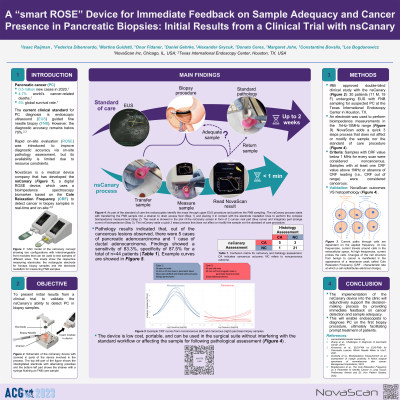Sunday Poster Session
Category: Biliary/Pancreas
P0022 - A “Smart ROSE” Device for Immediate Feedback on Sample Adequacy and Cancer Presence in Pancreatic Biopsies: Initial Results From a Clinical Trial With NsCanary
Sunday, October 22, 2023
3:30 PM - 7:00 PM PT
Location: Exhibit Hall

Has Audio

Isaac Raijman, MD
Texas International Endoscopy Center
Houston, TX
Presenting Author(s)
Award: Presidential Poster Award
Isaac Raijman, MD1, Federica Dibennardo, MS2, Martina Guidetti, PhD2, Onur Fidaner, PhD2, Daniel S Gehrke, BS2, Alexander Grycuk, BS2, Donato Ceres, PhD2, Margaret C. John, MS2, Constantine H Bovalis, BS2, Les Bogdanowicz, PhD2
1Texas International Endoscopy Center, Houston, TX; 2NovaScan Inc., Chicago, IL
Introduction: Pancreatic cancer (PC) accounts for half a million new cases and 4.7% of cancer-related deaths globally in 2020. Endoscopic ultrasound (EUS) guided fine needle biopsies (FNB) are the current standard for confirming suspicious lesions, although their diagnostic accuracy remains below 70%. Rapid on-site evaluation (ROSE) was introduced to improve FNB diagnostic accuracy via pathology assessment performed on-site. However, ROSE availability is often limited due to resource constraints. NovaScan has developed the nsCanary, a ”smart ROSE” device, which uses a bioimpedance spectroscopy biomarker based on the Cole Relaxation Frequency (CRF) to detect cancer ex-vivo, in real-time and on-site. The aim of this study is to present initial results from a clinical trial that validates the nsCanary’s ability to detect PC in FNBs obtained during endoscopic procedures.
Methods: Data were collected in a double-blind IRB approved study from a cohort of 30 patients (11 males, 19 females) undergoing EUS procedures with FNB sampling for suspected pancreatic lesions at the Texas International Endoscopy Center in Houston, TX. Biopsy samples were flushed in a disposable strainer to drain any excess fluid before starting the scan (Figure 1). The scanning electrode was placed in contact with the sample to perform bioimpedance measurements in the 1 kHz - 10 MHz frequency range via an interdigitated array with alternating polarities (Figure 1). The assessment was completed in less than 30 seconds. Samples with CRF value below 1 MHz for every scan were considered noncancerous. Samples with at least one CRF value above 1MHz or absence of CRF reading (i.e., CRF out of range) were considered cancerous. PC assessment provided by nsCanary was validated against pathology outcomes for each biopsy sample.
Results: Pathology results indicate that out of the cancerous lesions observed, there were five cases of pancreatic adenocarcinoma and one case of ductal adenocarcinoma. According to Table 1, findings show a sensitivity of 83.3% and specificity of 87.5% for n=30 patients.
Discussion: The device is low cost, portable, and can be used in the operating room without interfering with the standard of care or affecting the sample. The implementation of the nsCanary device into the clinical workflow will support the decision-making process by providing immediate feedback on cancer detection and sample adequacy, thereby enabling clinicians to overcome the challenge of proving cancer presence during the first biopsy procedure.

Disclosures:
Isaac Raijman, MD1, Federica Dibennardo, MS2, Martina Guidetti, PhD2, Onur Fidaner, PhD2, Daniel S Gehrke, BS2, Alexander Grycuk, BS2, Donato Ceres, PhD2, Margaret C. John, MS2, Constantine H Bovalis, BS2, Les Bogdanowicz, PhD2. P0022 - A “Smart ROSE” Device for Immediate Feedback on Sample Adequacy and Cancer Presence in Pancreatic Biopsies: Initial Results From a Clinical Trial With NsCanary, ACG 2023 Annual Scientific Meeting Abstracts. Vancouver, BC, Canada: American College of Gastroenterology.
Isaac Raijman, MD1, Federica Dibennardo, MS2, Martina Guidetti, PhD2, Onur Fidaner, PhD2, Daniel S Gehrke, BS2, Alexander Grycuk, BS2, Donato Ceres, PhD2, Margaret C. John, MS2, Constantine H Bovalis, BS2, Les Bogdanowicz, PhD2
1Texas International Endoscopy Center, Houston, TX; 2NovaScan Inc., Chicago, IL
Introduction: Pancreatic cancer (PC) accounts for half a million new cases and 4.7% of cancer-related deaths globally in 2020. Endoscopic ultrasound (EUS) guided fine needle biopsies (FNB) are the current standard for confirming suspicious lesions, although their diagnostic accuracy remains below 70%. Rapid on-site evaluation (ROSE) was introduced to improve FNB diagnostic accuracy via pathology assessment performed on-site. However, ROSE availability is often limited due to resource constraints. NovaScan has developed the nsCanary, a ”smart ROSE” device, which uses a bioimpedance spectroscopy biomarker based on the Cole Relaxation Frequency (CRF) to detect cancer ex-vivo, in real-time and on-site. The aim of this study is to present initial results from a clinical trial that validates the nsCanary’s ability to detect PC in FNBs obtained during endoscopic procedures.
Methods: Data were collected in a double-blind IRB approved study from a cohort of 30 patients (11 males, 19 females) undergoing EUS procedures with FNB sampling for suspected pancreatic lesions at the Texas International Endoscopy Center in Houston, TX. Biopsy samples were flushed in a disposable strainer to drain any excess fluid before starting the scan (Figure 1). The scanning electrode was placed in contact with the sample to perform bioimpedance measurements in the 1 kHz - 10 MHz frequency range via an interdigitated array with alternating polarities (Figure 1). The assessment was completed in less than 30 seconds. Samples with CRF value below 1 MHz for every scan were considered noncancerous. Samples with at least one CRF value above 1MHz or absence of CRF reading (i.e., CRF out of range) were considered cancerous. PC assessment provided by nsCanary was validated against pathology outcomes for each biopsy sample.
Results: Pathology results indicate that out of the cancerous lesions observed, there were five cases of pancreatic adenocarcinoma and one case of ductal adenocarcinoma. According to Table 1, findings show a sensitivity of 83.3% and specificity of 87.5% for n=30 patients.
Discussion: The device is low cost, portable, and can be used in the operating room without interfering with the standard of care or affecting the sample. The implementation of the nsCanary device into the clinical workflow will support the decision-making process by providing immediate feedback on cancer detection and sample adequacy, thereby enabling clinicians to overcome the challenge of proving cancer presence during the first biopsy procedure.

Figure: Schematic shows the nsCanary device and the zoomed-in parts of the device involved in the process. The top left part of the figure illustrates the interdigitated electrode with alternating polarities and the bottom right depicts the strainer with an FNB core sample.
| Pathology Outcome | |||
|---|---|---|---|
| CA | NC | ||
| nsCanary Assessment | CA | 5 | 3 |
| NC | 1 | 21 | |
Table: Confusion matrix for nsCanary assessments and pathology outcomes. CA indicates cancerous outcome, NC refers to noncancerous outcome.
Disclosures:
Isaac Raijman: Boston Scientific Corporation – Advisor or Review Panel Member. ConMed – Speakers Bureau. EndoRx – Owner/Ownership Interest. EndoSound – Advisory Committee/Board Member. Medtronic – Speakers Bureau. Microtech – Advisory Committee/Board Member. Pentax – Advisory Committee/Board Member.
Federica Dibennardo indicated no relevant financial relationships.
Martina Guidetti indicated no relevant financial relationships.
Onur Fidaner indicated no relevant financial relationships.
Daniel S Gehrke indicated no relevant financial relationships.
Alexander Grycuk indicated no relevant financial relationships.
Donato Ceres indicated no relevant financial relationships.
Margaret C. John indicated no relevant financial relationships.
Constantine H Bovalis indicated no relevant financial relationships.
Les Bogdanowicz indicated no relevant financial relationships.
Isaac Raijman, MD1, Federica Dibennardo, MS2, Martina Guidetti, PhD2, Onur Fidaner, PhD2, Daniel S Gehrke, BS2, Alexander Grycuk, BS2, Donato Ceres, PhD2, Margaret C. John, MS2, Constantine H Bovalis, BS2, Les Bogdanowicz, PhD2. P0022 - A “Smart ROSE” Device for Immediate Feedback on Sample Adequacy and Cancer Presence in Pancreatic Biopsies: Initial Results From a Clinical Trial With NsCanary, ACG 2023 Annual Scientific Meeting Abstracts. Vancouver, BC, Canada: American College of Gastroenterology.

